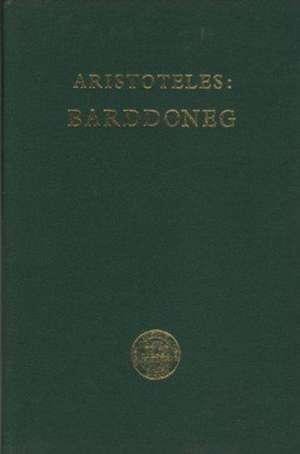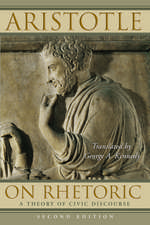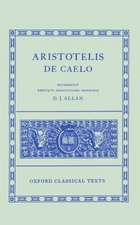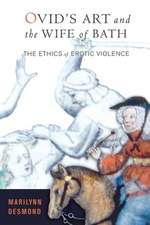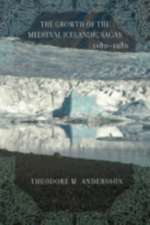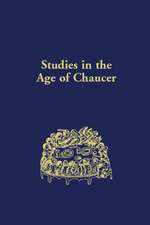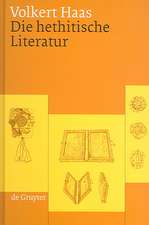Poetics
Autor Aristotle Traducere de J. G. Griffithsen Limba Engleză Hardback – 6 aug 1978
| Toate formatele și edițiile | Preț | Express |
|---|---|---|
| Paperback (8) | 26.12 lei 3-5 săpt. | |
| West Margin Press – 9 dec 2020 | 26.12 lei 3-5 săpt. | |
| OUP OXFORD – 10 ian 2013 | 46.28 lei 10-16 zile | +14.57 lei 5-11 zile |
| Outlook Verlag – 24 sep 2019 | 139.51 lei 3-5 săpt. | |
| Lulu.Com – 15 noi 2020 | 45.32 lei 6-8 săpt. | |
| Lulu.Com – mai 2018 | 45.52 lei 6-8 săpt. | |
| Binker North – iun 1902 | 63.09 lei 6-8 săpt. | |
| Classy Publishing – 5 apr 2023 | 81.47 lei 6-8 săpt. | |
| Clarendon Press – 5 mar 1980 | 355.92 lei 31-37 zile | |
| Hardback (4) | 128.57 lei 6-8 săpt. | |
| Outlook Verlag – 24 sep 2019 | 288.90 lei 3-5 săpt. | |
| Binker North – 28 dec 2019 | 128.57 lei 6-8 săpt. | |
| Lulu.Com – mai 2018 | 146.35 lei 6-8 săpt. | |
| Lulu.Com – 15 noi 2020 | 168.18 lei 6-8 săpt. |
Preț: 64.00 lei
Nou
Puncte Express: 96
Preț estimativ în valută:
12.25€ • 12.75$ • 10.35£
12.25€ • 12.75$ • 10.35£
Carte indisponibilă temporar
Doresc să fiu notificat când acest titlu va fi disponibil:
Se trimite...
Preluare comenzi: 021 569.72.76
Specificații
ISBN-13: 9780708306949
ISBN-10: 0708306942
Pagini: 166
Ilustrații: No
Dimensiuni: 140 x 220 mm
Editura: University of Wales Press
ISBN-10: 0708306942
Pagini: 166
Ilustrații: No
Dimensiuni: 140 x 220 mm
Editura: University of Wales Press
Descriere
Descriere de la o altă ediție sau format:
'What is poetry, how many kinds of it are there, and what are their specific effects?'Aristotle's Poetics is the most influential book on poetry ever written. A founding text of European aesthetics and literary criticism, from it stems much of our modern understanding of the creation and impact of imaginative writing, including poetry, drama, and fiction. For Aristotle, the art of representation conveys universal truths which we can appreciate more easily than the lessons of history or philosophy. In his short treatise Aristotle discusses the origins of poetry and its early development, the nature of tragedy and plot, and offers practical advice to playwrights. This new translation by Anthony Kenny is accompanied by associated material from Plato and a range of responses from more modern literary practitioners: Sir Philip Sidney, P. B. Shelley, and Dorothy L. Sayers. The book includes a wide-ranging introduction and notes, making this the most accessible and attractive modern edition. ABOUT THE SERIES: For over 100 years Oxford World's Classics has made available the widest range of literature from around the globe. Each affordable volume reflects Oxford's commitment to scholarship, providing the most accurate text plus a wealth of other valuable features, including expert introductions by leading authorities, helpful notes to clarify the text, up-to-date bibliographies for further study, and much more.
'What is poetry, how many kinds of it are there, and what are their specific effects?'Aristotle's Poetics is the most influential book on poetry ever written. A founding text of European aesthetics and literary criticism, from it stems much of our modern understanding of the creation and impact of imaginative writing, including poetry, drama, and fiction. For Aristotle, the art of representation conveys universal truths which we can appreciate more easily than the lessons of history or philosophy. In his short treatise Aristotle discusses the origins of poetry and its early development, the nature of tragedy and plot, and offers practical advice to playwrights. This new translation by Anthony Kenny is accompanied by associated material from Plato and a range of responses from more modern literary practitioners: Sir Philip Sidney, P. B. Shelley, and Dorothy L. Sayers. The book includes a wide-ranging introduction and notes, making this the most accessible and attractive modern edition. ABOUT THE SERIES: For over 100 years Oxford World's Classics has made available the widest range of literature from around the globe. Each affordable volume reflects Oxford's commitment to scholarship, providing the most accurate text plus a wealth of other valuable features, including expert introductions by leading authorities, helpful notes to clarify the text, up-to-date bibliographies for further study, and much more.
Notă biografică
Aristotle (Greek: ¿¿¿¿¿¿¿¿¿¿¿ Aristotél¿s, pronounced [aristotél¿¿s]; 384-322 BC)[A] was a Greek philosopher and polymath during the Classical period in Ancient Greece. Taught by Plato, he was the founder of the Lyceum, the Peripatetic school of philosophy, and the Aristotelian tradition. His writings cover many subjects. including physics, biology, zoology, metaphysics, logic, ethics, estheticspoetry, theatre, music, rhetoric, psychology, linguistics, economics, politics, and government. Aristotle provided a complex synthesis of the various philosophies existing prior to him. It was above all from his teachings that the West inherited its intellectual lexicon, as well as problems and methods of inquiry. As a result, his philosophy has exerted a unique influence on almost every form of knowledge in the West and it continues to be a subject of contemporary philosophical discussion.
Little is known about his life. Aristotle was born in the city of Stagira in Northern Greece. His father, Nicomachus, died when Aristotle was a child, and he was brought up by a guardian. At seventeen or eighteen years of age he joined Plato's Academy in Athens and remained there until the age of thirty-seven (c. 347 BC).[4] Shortly after Plato died, Aristotle left Athens and, at the request of Philip II of Macedon, tutored Alexander the Great beginning in 343 BC.[5] He established a library in the Lyceum which helped him to produce many of his hundreds of books on papyrus scrolls. Though Aristotle wrote many elegant treatises and dialogues for publication, only around a third of his original output has survived, none of it intended for publication.[6]
Aristotle's views on physical science profoundly shaped medieval scholarship. Their influence extended from Late Antiquity and the Early Middle Ages into the Renaissance, and were not replaced systematically until the Enlightenment and theories such as classical mechanics. Some of Aristotle's zoological observations found in his biology, such as on the hectocotyl (reproductive) arm of the octopus, were disbelieved until the 19th century. His works contain the earliest known formal study of logic, studied by medieval scholars such as Peter Abelard and John Buridan. Aristotle's influence on logic also continued well into the 19th century.
He influenced Islamic thought during the Middle Ages, as well as Christian theology, especially the Neoplatonism of the Early Church and the scholastic tradition of the Catholic Church. Aristotle was revered among medieval Muslim scholars as "The First Teacher" and among medieval Christians like Thomas Aquinas as simply "The Philosopher". His ethics, though always influential, gained renewed interest with the modern advent of virtue ethics, such as in the thinking of Alasdair MacIntyre and Philippa Foot.
